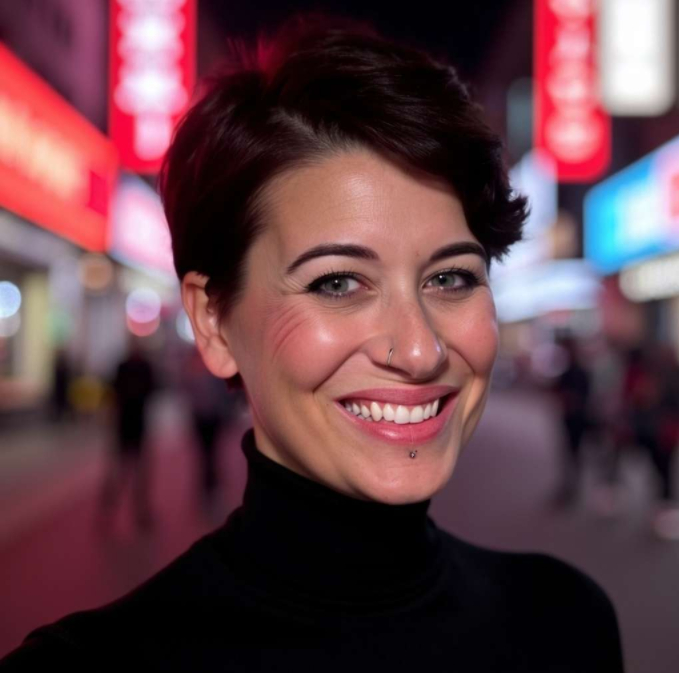We caught up with the brilliant and insightful Crystal Hart a few weeks ago and have shared our conversation below.
Crystal , thanks for taking the time to share your stories with us today When you’ve been a professional in an industry for long enough, you’ll experience moments when the entire field takes a U-Turn, an instance where the consensus completely flips upside down or where the “best practices” completely change. If you’ve experienced such a U-Turn over the course of your professional career, we’d love to hear about it.
Absolutely, I’ve experienced several shifts in my career, but one of the most profound “U-turns” has been around how identity, particularly queer identity is acknowledged, centered, and respected within professional spaces. Earlier in my career, being openly queer in the workplace came with unspoken expectations to either downplay or over-explain parts of my identity depending on the setting. There was an underlying assumption that queerness was a “niche” issue, relevant only in certain contexts or with certain clients, rather than something inherently valid, complex, and worthy of space in every room.
What’s changed dramatically, and for the better, is that more professionals, organizations, and clients now recognize that identity, intersectionality, and lived experience deeply shape how we show up, how we lead, and how we support others. Best practices have evolved to not just tolerate, but actively integrate inclusive and trauma-informed approaches that affirm queer, trans, and non-binary people.
That said, these changes haven’t happened in a vacuum. The shifting political and social climate has forced many of us, especially those of us who are queer, to be more intentional, more vocal, and frankly, more strategic. With rising anti-LGBTQ+ legislation and rhetoric in some regions, what used to be considered progressive has now become necessary. I’ve had to adapt by embedding advocacy into my professional practice in ways I hadn’t before, whether that’s updating intake forms to reflect inclusive language, creating safer spaces for clients and colleagues, or directly addressing systemic harm in my work.
The U-turn has been this: from queerness being seen as something to be “accommodated” quietly, to it becoming essential to how we understand equity, ethics, and care. And as a queer professional, I’ve learned that adaptation isn’t just about surviving change, it’s about helping lead it, even when it’s uncomfortable or unpopular.

As always, we appreciate you sharing your insights and we’ve got a few more questions for you, but before we get to all of that can you take a minute to introduce yourself and give our readers some of your back background and context?
I’m a queer-identifying therapist whose work is rooted in liberation, intersectionality, and healing. I came into this field not just as a career path, but as a personal and political commitment, because for many queer and marginalized folks, survival and self-expression are deeply intertwined.
Like many people in my community, I didn’t see myself fully represented in mainstream models of care or creativity. I didn’t see services or spaces that held the fullness of our identities, the complexity, the resilience, the grief, the joy. So, I decided to build the kind of work I wish had existed when I needed it most. That’s how I found myself in this field, and why I’ve stayed.
Today, I provide therapy, primarily supporting LGBTQIA+ individuals and other historically excluded communities. Whether I’m working with someone navigating trauma, burnout, identity development, or simply trying to find their voice, my role is to create a space where they can show up fully, without having to explain or defend who they are.
What sets my work apart is that it’s not just affirming, it’s transformational. I don’t just help people “cope” with systems that harm them. I work to help them name those systems, reconnect with their agency, and define healing on their own terms. I integrate modalities like CBT, EMDR, ACT, somatics, creativity, ancestral work, but always through a lens that prioritizes consent, safety, and cultural humility.
I’m most proud of the space I’ve cultivated, not just in my one-on-one work, but in the broader community of folks who’ve found resonance in my voice, values, and vision. The messages I get from people who say, “I didn’t know this kind of support existed for people like me,” or “I finally feel seen,” are the moments that remind me why I do this.
If there’s one thing I’d want potential clients, collaborators, or followers to know, it’s this: my work isn’t about fixing you, it’s about helping you return to yourself. Whether you’ve felt unseen, unheard, or unsafe in other spaces, know that you’re welcome here. This is a space built by and for people like us, queer, complex, tender, powerful, and you don’t have to shrink to belong.
How’d you build such a strong reputation within your market?
At my core, I’m someone who deeply values authenticity, both in how I show up and in the spaces I create for others. I work in a field where people often feel pressure to compartmentalize themselves or “perform” a version of healing that fits into a box. But I believe the most meaningful change happens when people feel safe enough to be real. That belief guides everything I do.
I came into this work not only with lived experience as a queer person navigating complex systems, but also with formal training in evidence-based approaches like CBT, ACT, EMDR, and trauma-informed care. I’ve spent years developing my clinical and creative skills because I want my clients to know they’re working with someone who’s both professionally grounded and personally invested in their well-being.
My practice centers around supporting LGBTQIA+ individuals, neurodivergent folks, and anyone who’s ever felt “othered” in traditional healing or professional spaces. I work with clients on everything from trauma recovery and anxiety to self-trust, identity development, and emotional regulation. But beyond the issues, what I really help people do is come back to themselves, with honesty, compassion, and skill.
What sets my work apart is the balance between training and humanity. I don’t hide behind jargon, but I’m not winging it either. My clients and collaborators often tell me that what makes me different is my ability to hold complexity to make space for grief and humor, theory and instinct, accountability and care, all at the same time.
What I’m most proud of is that the work I do actually works—not because it’s perfect, but because it’s honest. I’ve built a practice and a reputation that reflect who I really am: someone who believes that authenticity is not only healing, but revolutionary. And I want anyone considering working with me to know that they don’t have to perform, shrink, or translate their experiences in order to be understood. I meet people exactly where they are, with the training to support them and the heart to hold them.
We’d love to hear a story of resilience from your journey.
One story that stands out for me, and really reflects my resilience, comes from a time earlier in my career when I was working in a professional environment that claimed to value equity and inclusion but, in practice, did not make space for real accountability or lived experience, especially from people like me. As a queer person, and someone who deeply values honesty and social justice, I started to notice the disconnect almost immediately. Harmful dynamics were being ignored, clients weren’t being served with the nuance they deserved, and whenever I tried to speak up, about access, about identity, about outdated or harmful practices, I was met with defensiveness or silence.
There was one meeting in particular where I raised a concern about how the language we were using in our work was pathologizing queer and trans clients. I wasn’t angry, I was clear and grounded, but I remember the discomfort in the room being almost palpable. My feedback was quickly dismissed and reframed as me being “too passionate,” as though that was a liability. It became clear that what they really wanted was my presence, not my voice.
I kept trying for a while. I tried different approaches, softened my tone, gathered research, tried to appeal to logic, to policy, to values. But over time, I realized I was shrinking, editing myself to survive in a space that only valued people who didn’t disrupt the status quo. And I knew I couldn’t keep doing it. So I left. And that decision wasn’t easy, it came with grief, self-doubt, and fear. But it was also one of the most powerful acts of self-respect and resilience I’ve ever taken.
Since then, I’ve built work that does make space, for truth, for difference, for discomfort, for growth. I’ve created a practice where authenticity is not only safe, but expected. And I’ve learned that resilience isn’t about staying in places that diminish you, it’s about knowing when to stop negotiating your worth.
That experience taught me that resilience is not always loud or visible. Sometimes, it’s the quiet clarity of saying, I won’t stay small for this. That clarity has shaped everything I do now, and it’s why the work I offer is grounded in both compassion and radical honesty.
Contact Info:
- Website: https://innerbalancecounselingark.com
- Facebook: https://www.facebook.com/people/Crystal-Hart-MS-EdS-LPC/100095507982859/
- Linkedin: https://www.linkedin.com/in/crystal-hart-lac?original_referer=https%3A%2F%2Fwww.bing.com%2F
- Other: Psychology Today:
https://www.psychologytoday.com/us/therapists/crystal-hart-north-little-rock-ar/779385?msockid=2b8087a442e56e0a3f0392ed43b36fc8


